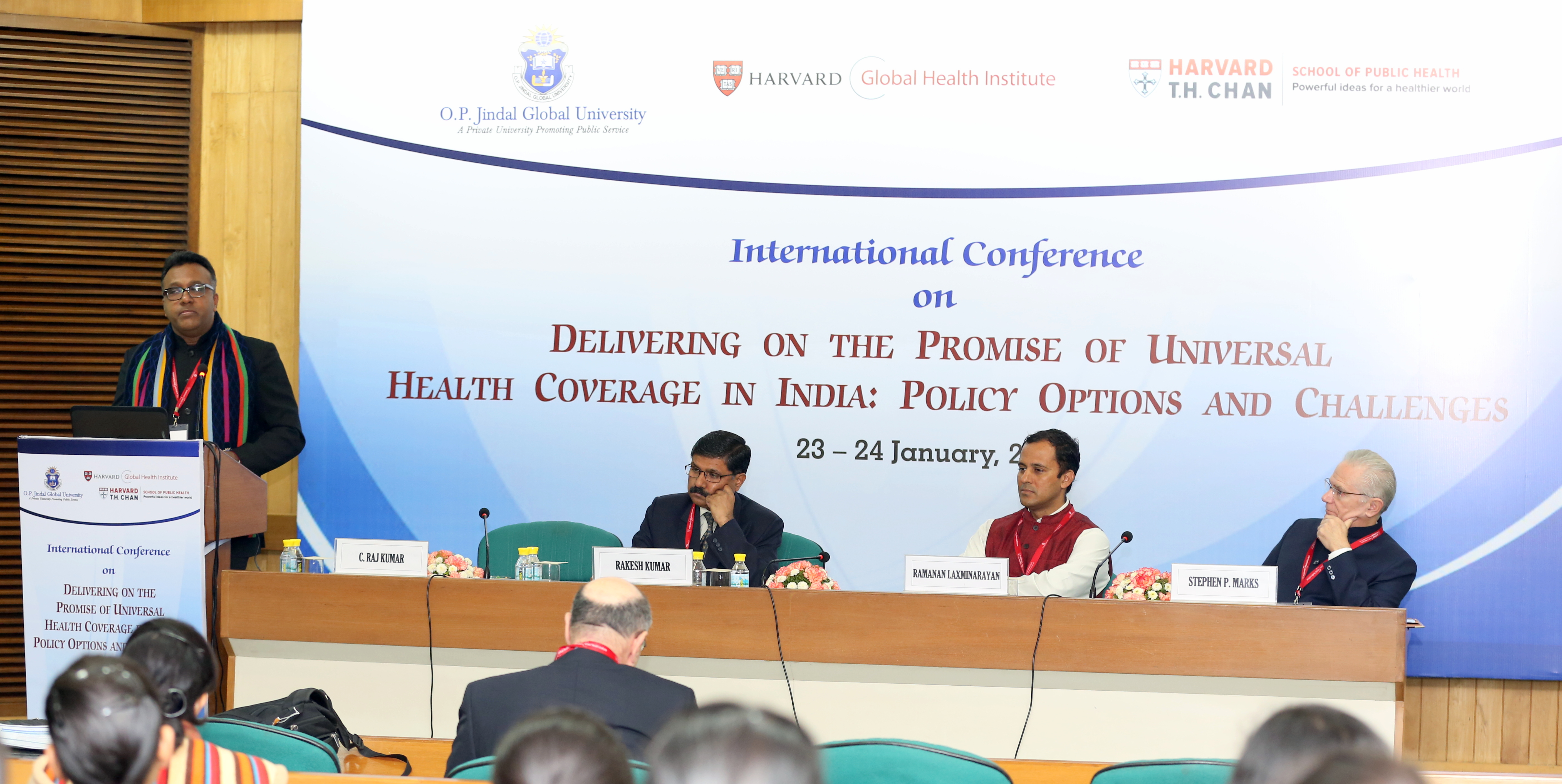New Delhi
January 25, 2016
- 70% mortality due to non-communicable diseases by 2020, says Joint Secretary, Ministry of Health and Family Welfare
- International conference jointly organized by the O.P. Jindal Global University (JGU), Harvard Global Health Institute and the Harvard T.H. Chan School of Public Health
- Leading academics and policy makers from across India and the world debate on issues of universal health coverage in the country
The O.P. Jindal Global University in collaboration with Harvard Global Health Institute and the Harvard T.H. Chan School of Public Health hosted an international conference, that brought together leading public health practitioners, academics and government representatives from both India and abroad to debate and deliberate upon some of the most critical and fundamental issues surrounding universal health coverage and public policy.
The two day event was kicked off at the India Habitat Center in Delhi with a series of intense and thought provoking discussions between subject matter experts.
The inaugural session of the conference highlighted key facts and issues namely India’s healthcare system ranked 112 out of 190 countries according to WHO World Health Report 2000. Expenditure on government health services amounts to about 1 percent of India’s GDP, or about 4.1 per cent if expenditure on private health services and household out-of-pocket (OOP) expenditure are included. Health insurance coverage only reaches about 17 percent of India’s population.
Delivering the welcome address at the forum, Professor C Raj Kumar, Founding Vice-Chancellor, O. P. Jindal Global University said, “Today’s conference is the culmination of an institutional collaboration between Jindal Global University, Harvard Global Health Initiative and the Harvard School of Public Health to examine legal, policy and regulatory issues relating to the universal health coverage in India. It brought together academics, policy makers, doctors, lawyers, public health practitioners, NGOs and government representatives to discuss and debate a central issue of public policy, which is about the efforts to achieve universal health coverage in India.”
Emphasizing on right to health as a constitutional promise Professor Kumar further added, “The need for achieving universal health coverage with a view to fulfilling the right to health in India is not only a public health issue, It is about fulfilling the democratic aspirations of Indian citizenry and achieving good governance; it is about seeking equality and non- discrimination in implementing public policy; and most importantly, it is about ensuring justice and fulfilling the constitutional promise.”
Delivering the Inaugural Address at the forum, Dr. Rakesh Kumar, Joint Secretary (Reproductive, Maternal, New Born, Child and Adolescent Health), Ministry of Health and Family Welfare, Government of India, shared some alarming facts with the audience
Quoting a study conducted by Ministry of Health and Family Welfare, Government of India, he said, “A steady and gradual increase has been observed in mortality due to non-communicable diseases (NCD), and there is a possibility that NCD may account for over 70% deaths by the year 2020.” He further highlighted that over 18% of the rural population in the country does not have access to basic healthcare facilities.
Dr. Kumar underlined the urgent need to develop a comprehensive health coverage policy in the country and also called for a nuanced understanding of the issues and challenges surrounding UHC, “I hope this debate and discourse will be meaningful and have a long-lasting impact as we evolve some of the most fundamental issues surrounding universal health coverage in the country.”, he noted.
Making a strong statement on health care affordability in the country, Dr. Ramanan Laxminarayan, Distinguished Professor, Public Health Foundation of India, said, “More than 2/3rd of the populace in our country has gone into impoverishment due to primary healthcare expenditure.”
The conference provided leading healthcare academics and policy practitioners a platform for exchanging the latest insights in both theory and practice.
About O.P. Jindal Global University
O.P. Jindal Global University (JGU) is a non-profit global university established by the Haryana Private Universities (Second Amendment) Act, 2009. The vision of JGU is to promote global courses, global programmes, global curriculum, global research, global collaborations, and global interactions through global faculty. JGU is situated on an 80-acre state-of-the-art residential campus in the National Capital Region of Delhi.
About Harvard Global Health Institute
The Harvard Global Health Institute (HGHI) is a cross-university Institute, which aims to build and strengthen an emerging field of global health. HGHI works to develop an educational platform that reframes world health issues within a broader context and establishes a conceptual foundation to guide the design of new curricula.
About Harvard T.H. Chan School of Public Health
Harvard T.H. Chan School of Public Health is one of the most selective and prestigious public health schools in the world. Founded in 1913, the Harvard T.H. Chan School of Public Health—grew out of the Harvard-MIT School for Health Officers, the nation’s first graduate training program in public health.


